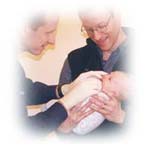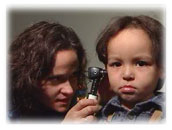Universal Newborn Hearing Screening
Early Hearing Detection & Intervention (EHDI) Program
Resources for Healthcare Providers and Birthing Hospital Personnel
The following resources were developed by Alaska’s Early Hearing Detection & Intervention Program and are available for distribution.
 Alaska’s Universal Newborn Hearing Screening Hospital Orientation Manual comprehensively details steps necessary to implementing successful newborn hearing screening programs in birthing facilities. This manual was developed for Alaskan communities, specifically accounting for additional challenges placed on rural locations. The manual is available for birthing facilities interested in implementing newborn hearing screening programs in their communities. For hard copies, to receive the order form, and click here to .
Alaska’s Universal Newborn Hearing Screening Hospital Orientation Manual comprehensively details steps necessary to implementing successful newborn hearing screening programs in birthing facilities. This manual was developed for Alaskan communities, specifically accounting for additional challenges placed on rural locations. The manual is available for birthing facilities interested in implementing newborn hearing screening programs in their communities. For hard copies, to receive the order form, and click here to .
 “Sounds & Silence: A Guide To Identifying Hearing Loss in Children” was developed to educate primary healthcare providers throughout Alaska residing in rural communities, specifically Community Health Aides/Practitioners (CHA/Ps), about the importance of early hearing detection. For infants/children living in rural communities, it is imperative that the primary healthcare providers be given the knowledge necessary for early detection of hearing loss, as well as surveillance of infants/children identified at birth with high risk factors for progressive hearing loss. The 15-minute video/DVD will educate the viewer about hearing loss, the high risk factors for progressive hearing loss, the developmental milestones for speech and hearing, and most importantly, the proper protocol regarding diagnosis and early intervention for an infant/child with a suspected hearing loss.
“Sounds & Silence: A Guide To Identifying Hearing Loss in Children” was developed to educate primary healthcare providers throughout Alaska residing in rural communities, specifically Community Health Aides/Practitioners (CHA/Ps), about the importance of early hearing detection. For infants/children living in rural communities, it is imperative that the primary healthcare providers be given the knowledge necessary for early detection of hearing loss, as well as surveillance of infants/children identified at birth with high risk factors for progressive hearing loss. The 15-minute video/DVD will educate the viewer about hearing loss, the high risk factors for progressive hearing loss, the developmental milestones for speech and hearing, and most importantly, the proper protocol regarding diagnosis and early intervention for an infant/child with a suspected hearing loss.
View full video on identifying hearing loss in children.
Loaner Program
The Early Hearing Detection & Intervention (EHDI) Program within the Division of Health Care Services (DHCS) collaboratively worked with a variety of providers, parents, and deaf adults in the development of a screening and diagnostic program intended to identify newborns and infants who have congenital, or are at risk, of early onset hearing loss. In addition, the EHDI program designed avenues to support newborns and very young children once identified with hearing loss, with referrals to early intervention, resource materials, parent support systems, and resources for assistive hearing devices.
As part of the effort in building the program and enhancing existing referral systems, taskforces were developed to work with state staff to improve or build needed infrastructure. One of the systems identified by the audiologists working on the EHDI Diagnostics Taskforce was a loaner program in which assistive hearing devices could be loaned out to children, newborn to three years of age. Children eligible are those who do not qualify for Medicaid/Denali KidCare, or who private insurance does not adequately cover specific assistive hearing devices that would be most beneficial to the newborn or young child.
For additional information about the Alaska EHDI Loaner Program and/or the Alaska EHDI Program, please to contact us.
